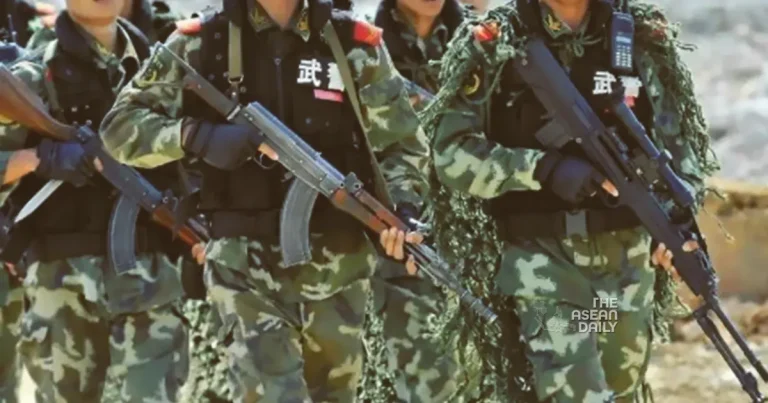25-12-2023 (BEIJING) When “Wolf Warrior 2” stormed China’s cinemas in 2017, the resonating echoes of flag-waving patriotism and a lone Chinese warrior facing foreign threats birthed the term “wolf-warrior diplomacy.” This cinematic wave, dominated by harrowing war thrillers, propagated a narrative that China should vigorously defend its overseas interests, even if it meant resorting to force.
Beyond the silver screen, the reality of safeguarding Chinese interests overseas appears to be shifting towards reliance on private security contractors rather than the People’s Liberation Army (PLA). The recent conflicts in Ukraine and Israel-Gaza underscore the potential dangers faced by Chinese investors, prompting Beijing to reevaluate strategies for securing its global interests and vital trade routes.
Beijing’s military footprint overseas remains limited, with only one foreign base in the Horn of Africa, contributing to UN peacekeeping efforts and deploying naval warships in anti-piracy operations. Analysts predict a growing dependence on diplomacy and private security firms, especially in facilitating the ambitious China-led Belt and Road Initiative (BRI).
In a December seminar jointly organized by the China-Africa Business Council and the China Institutes of Contemporary International Relations, stakeholders advocated for a more internationalized, localized, and commercialized approach for Chinese security firms. Outbound Chinese investors, facing security challenges in complex environments, require tailor-made strategies that vary across industries and countries.
The African continent, where the narrative of “Wolf Warrior 2” unfolded, is a crucial focus for China, hosting 7.1% of globally invested Chinese companies. China boasts approximately 47,000 overseas firms across 190 countries, spanning energy, mining, infrastructure construction, and manufacturing.
A 2022 Ministry of Commerce report reveals that these ventures employ 4.1 million individuals, including 2.5 million foreign citizens. With outstanding outbound direct investment reaching $2.75 trillion by the end of 2022, China remains the world’s third-largest investor, emphasizing the Belt and Road regions, often deemed high-risk.
While these economic strides secure China’s position as a major global consumer of commodities, including iron ore, copper, and soybeans, the associated risks have spurred a demand for enhanced security measures. Chinese private security firms, previously flying under the radar, are now stepping into the limelight.
December’s seminar united prominent domestic security players, including Huayuan Security Guard, Dewe Security (a Frontier Services Group subsidiary), Huaxin Zhongan Group, and Anbang Save-Guard Group. The event aimed to address traditional safety concerns in regions like West Asia, Africa, and Latin America, as well as newer challenges arising from global conflicts such as the Ukraine war and the Israel-Palestinian conflict.
Li Xiaopeng, CEO of Frontier Services, a major player in private security, highlighted the evolving landscape. His clients, primarily state-owned enterprises engaged in overseas construction projects, now face inquiries about evacuating Chinese citizens from conflict zones.
The Belt and Road Initiative working group, in a late November document, stressed the necessity of detailed safety protection, emphasizing the need for corporations to assess risks comprehensively before venturing abroad. The Ministry of State Security has also pledged to ensure the security of China’s overseas mining projects, personnel, and assets.
Muhammad Jilani, a private security adviser in Pakistan, noted the increasing demand for robust security programs due to the expanding scope of the Belt and Road Initiative. Security deployments encompass various aspects, including AI, digital (cyber/IT), and physical security. The high demand is driven by the perilous nature of Chinese projects operating in some of the world’s most dangerous regions.
China’s past experiences, such as the large-scale evacuation from Libya in 2011 and the ongoing security alerts, highlight the need for comprehensive security measures. Terrorist attacks on Chinese projects, as seen in the China-Pakistan Economic Corridor, underscore the risks inherent in Beijing’s global economic endeavors.
Compared to established foreign private security firms, China’s counterparts are relatively new to the market. While international firms like G4S, Olive Group, and International SOS have decades of experience, Chinese companies face restrictions on carrying firearms, limiting their competitive edge. Despite being smaller than Western peers, Chinese security firms often have historical ties with the military or police forces.
Huaxin Zhongan, established by military veterans in 2004, exemplifies this connection, with 70% of its mid-level or top management comprising veterans. The company, serving over 60 overseas clients, specializes in escorting shipments, countering drones, and providing security for Chinese projects, along with risk assessments and consulting.
As China’s overseas projects become increasingly scrutinized by the State-owned Assets Supervision and Administration Commission (SASAC), security management gains importance. The SASAC oversees 97 large industrial giants with combined assets of 81 trillion yuan, emphasizing the need for proper security management to avoid project scrutiny.
Despite the challenges, Li at Frontier Services Group sees a two-pronged strategy: leveraging the power of private security companies and seeking governmental support from host countries. While the sector still has a long way to go in terms of development, Chinese private security firms are actively seeking talent and policy support to compete globally.




